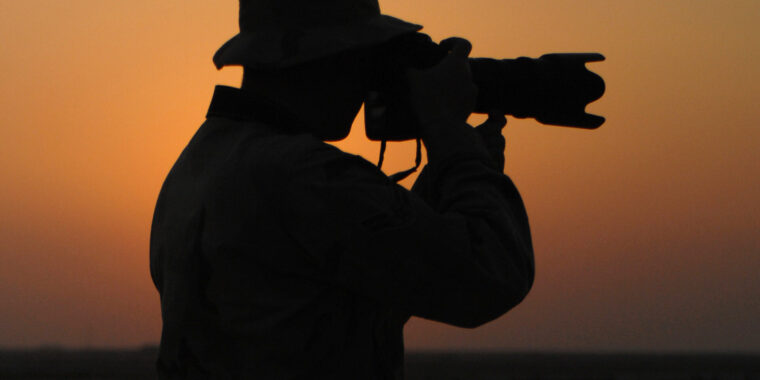
On Tuesday afternoon, the Karsh Institute of Democracy and the Public Service Pathways program co-hosted an event titled “Photojournalism on the Front Lines: The Emotional Toll.” The panel featured several photojournalists, including Michael Robinson Chávez, two-time Pulitzer Prize winner; Kirsten Luce; and Ryan M. Kelly, who won a Pulitzer Prize for his coverage of the deadly August 2017 Charlottesville car attack. Moderating the discussion was Sanjay Suchak, documentary and commercial photographer and a Karsh Practitioner Fellow in Democracy.
To kick off the conversation and provide a framework for the event, Suchak emphasized the importance of a free press for democracy. Photojournalists hold a unique role in reporting, he said—they cannot cover a story “from two countries away,” but rather must be in the action on the ground.
Before turning to the experiences the photojournalists have had on their hundreds of trips abroad, Suchak asked them to reflect on how they got started in the field. Two of the guests shared local ties: Luce’s teacher at Albemarle High School introduced her to the magic of the darkroom, and Kelly is a Virginia native who spent several years in Charlottesville working for The Daily Progress.
Chávez, a specialist in covering climate change and its effects on human civilization, shared stories of his travels to the most conflict-ridden corners of the globe. He touched on his coverage of war in Ukraine in 2022, the obstacles of photographing in the Democratic Republic of Congo, and his experience wielding the skill of disarming to “cool the fever” at the U.S. Capitol on the morning of January 6, 2021.
Chávez named the helplessness he often feels as the hardest part of his job. “I’m there to bring you there,” he said, and while he hopes he makes an impact through the stories his images tell, he often wishes he could do more to help the dire situations he witnesses. He explained that while some people think cameras are a photojournalist’s shield, he has experienced them more like a mirror, magnifying the situation back in his face.
Luce is best known for her coverage of the U.S.-Mexico border. In an era of intense partisan division, she mentioned being struck by how two people can see the same photo and have completely opposite reactions to it. To help combat the misinformation surrounding the border, she focuses on listening to stories of both migrants and border officials, attempting to treat everyone with respect and humanity.
Luce also spent several months covering “selfie tourism” and animal tourism—an industry offering tourists opportunities to be photographed with cute animals without disclosing the abusive practices used to train such animals—for National Geographic. Drawing a contrast between her work on immigration and animal cruelty, Luce described the frequent responses she still receives for the National Geographic story, years after it was published. “Empathy is so uncomplicated for animals…but we don’t get that response for migrants,” she said. She wishes people were as horrified by the human suffering she’s seen as they are for animals.
Finally, Kelly described his role in covering the Unite the Right rally. While most people remember the deadly weekend in August 2017, local journalists had been reporting on the unfolding situation for months. Kelly’s coverage for The Daily Progress began with the fight against Confederate sculptures in Charlottesville and occasional counter-protests early in the summer, generally centering on benign issues like court dates and locations.
On August 12, 2017, Kelly captured a photo of the car attack that killed Heather Heyer and injured over a dozen others. Although that one picture was seen around the world, Kelly humbly explained that he is only one of the many local journalists covering local news every day. He also discussed both his discomfort around winning a Pulitzer Prize for his coverage of a death and his gratitude for having connected with Heyer’s friends and family in the years since.
While their jobs have taken the three photojournalists to very different places, they all agreed on the significance of open communication. Luce drew attention to the fact that social media often frames news in a way that lends itself well to a “like,” over-simplifying the story. Add that to social media users’ tendencies to only see and reshare what they agree with, and free press faces a slippery slope.
Each member of the panel stressed the importance of questioning, listening, seeking out information one may not agree with, and treating others with respect. The engaged audience left with a better understanding of the role a free press, and particularly photojournalism, plays in maintaining democracy.


Leave a Reply